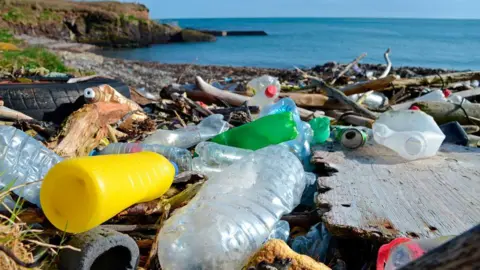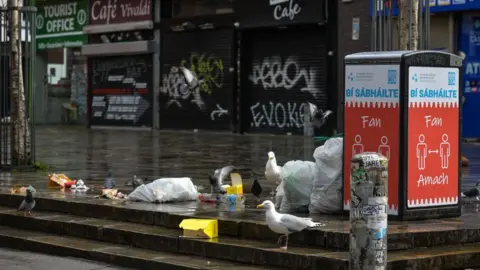Ireland Faces Waste Management Crisis as Recycling Rate Stagnates
Table of Contents
Table of Contents
ireland’s ability to effectively manage its waste is facing significant challenges, according to a recent report by the Environmental Protection Agency (EPA).The report reveals a concerning trend: despite a more than 20% rise in waste generation over the past decade, Ireland’s recycling rate has remained stagnant.This troubling combination strongly suggests the country is on track to miss crucial European Union recycling targets for both municipal and packaging waste by 2025.

The EPA’s “Circular Economy and Waste Statistics Highlights Report 2022” paints a stark picture. according to the report, construction is the leading contributor to Ireland’s waste generation, accounting for half of all waste produced. The EPA warns that the country’s waste management system is “vulnerable and underperforming” and immediate action is needed to avert a full-blown crisis.
Ireland’s Recycling Rate Stalls, Environmental Agency Reports
Ireland’s progress towards a circular economy, a system that prioritizes reusing and repurposing materials before recycling, has hit a roadblock, according to a new report by the Environmental Protection Agency (EPA). While Ireland has made strides in certain areas, key challenges remain. The EPA’s report highlights a recycling rate of 41% for 2022, a figure that has remained stagnant for several years. This falls short of the target of 55% set for 2025. Additionally, Ireland’s ability to manage and process waste domestically is considered “vulnerable and underperforming,” with 1.2 million tonnes, or 38%, of municipal waste being exported annually for treatment.
The EPA’s report highlights a recycling rate of 41% for 2022, a figure that has remained stagnant for several years. This falls short of the target of 55% set for 2025. Additionally, Ireland’s ability to manage and process waste domestically is considered “vulnerable and underperforming,” with 1.2 million tonnes, or 38%, of municipal waste being exported annually for treatment.
Focus on Reuse and Recovery
While recycling is crucial, the EPA emphasizes the greater importance of transitioning towards a circular economy. This model emphasizes extending the lifespan of materials through reuse, repair, and repurposing, minimizing the need for recycling in the first place. “David Flynn, Director of the EPA, stated that the “progress towards a circular economy… has stalled.” This statement highlights the need for urgent action to promote sustainable practices and reduce Ireland’s reliance on exporting waste.Ireland Needs ‘Deeper Change’ to Boost Recycling Rates
Ireland faces a pressing challenge: its current recycling efforts fall short of meeting mandatory targets for municipal waste and plastic packaging. The Environmental Protection Agency (EPA) has stressed the need for a significant shift in practices to reduce waste and increase recycling across all sectors of the economy. The construction industry stands out as a positive exmaple, demonstrating a high rate of material reuse and recovery, reaching an extraordinary 82%. While this sector aims to recover 70% of its materials, primarily through backfilling and land restoration, the overall picture remains concerning. “Deeper change is needed right across the economy to accelerate the transition to a more circular economy,” stated Warren Phelan, the EPA’s Circular Economy Programme Manager. He emphasized the need for “effective regulation, incentives and enforcement to influence businesses and consumers to adopt best practices in production, supply, purchasing, use and reuse of goods, products and services.” Current recycling rates in Ireland lag behind those in Northern Ireland. The 41% recycling rate recorded in Ireland for 2022 pales in comparison to the 49.7% achieved in Northern ireland during the 2022/23 period. Efforts are underway to address this gap. The Irish government is reviewing waste collection practices with the aim of increasing recycling rates. The findings of this consultation are expected to be published in the coming year.## Archyde Interview Transcript: Recycling Crisis Looms in Ireland
**Host:** Welcome back to Archyde. Today we’re discussing a pressing issue facing Ireland: the looming waste management crisis. Joining me is Dr. Mary O’Connell, leading environmental expert and author of the recent EPA report highlighting the stagnation of Ireland’s recycling rate. Dr. O’Connell, thank you for being here.
**Dr. O’Connell:** Thank you for having me.
**Host:**
Yoru report paints a concerning picture. Can you elaborate on the key findings and why they should concern us?
**Dr. O’Connell:** Certainly. Our findings show a disturbing trend. Despite a 20% increase in waste generation over the last decade, ireland’s recycling rate has remained stubbornly stagnant. this means we’re on a direct collision course with EU targets for 2025, both for municipal and packaging waste.
**Host:** What are the primary factors contributing to this worrying lack of progress?
**dr. O’Connell:**
There are a several contributing factors.
Firstly, construction and demolition waste accounts for a staggering 50% of all waste generated in Ireland. This highlights the need for increased focus on sustainable construction practices and better waste management plans within the construction industry.
Secondly, there’s a latent issue with lack of infrastructure for effectively sorting and processing recyclables. This leads to a significant amount of recyclable materials ending up in landfill.
consumer awareness and behavior play a critical role. We need better public education campaigns to encourage individuals to reduce waste, reuse items, and recycle properly.
**Host:** your report focuses on the idea of a circular economy. Could you explain what this means in the context of waste management and why it’s so critically important?
**Dr. O’Connell:**
Absolutely.
A circular economy is a system
where we move beyond the conventional “take-make-dispose” model and rather prioritize reusing and repurposing materials.
This minimizes waste generation, conserves resources, and reduces our environmental footprint.
It’s not just about recycling; it’s about redesigning products to be durable and repairable, promoting shared ownership models, and creating new business models that prioritize resource recovery.
**Host:** What specific actions can the Irish government and individuals take to address this pressing issue?
**Dr. O’Connell:
Government needs to prioritize investments in waste management infrastructure, including facilities for composting and anaerobic digestion.
There also needs to be stronger legislation and enforcement to promote producer obligation and penalize companies not meeting their recycling targets.
Individuals can make a big difference by reducing their consumption,composting kitchen waste,and ensuring materials are properly sorted before disposal.
Supporting local businesses committed to sustainable practices also sends a powerful message to the market.
**Host:**
Dr. O’Connell, thanks for your insightful analysis.
It’s clear that the waste management crisis requires urgent and collaborative action from all stakeholders.
We hope this conversation raises awareness and spurs meaningful change.
**Dr. O’Connell:**
My pleasure. Thank you for having me.
Let’s hope we can collectively turn the tide on this issue before it’s too late.
This is a great start to a news article about Ireland’s recycling challenges!
Here are some thoughts and suggestions to strengthen your piece:
**Content and Structure:**
* **Expand on the “Deeper Change” Needed:** You mentioned the need for “deeper change” but could delve deeper into specific examples of what this entails. Consider:
* **Policy changes:** What specific regulations or incentives could the government introduce to encourage recycling and reduce waste?
* **Industry responsibility:** How can industries like construction maintain their high reuse rates and encourage other sectors to follow suit?
* **Consumer behavior:** What steps can individuals take to contribute to a more circular economy?
* **Compare and contrast:** You touch on the difference between Ireland and Northern Ireland’s recycling rates. Exploring *why* Northern Ireland is performing better could offer valuable insights.
* **Solution-Oriented Approach:** While highlighting the problem is crucial, offering potential solutions and success stories can leave readers feeling empowered.
* feature interviews wiht organizations or individuals making a positive impact in recycling.
* Highlight innovative recycling technologies or community initiatives.
* **Data Visualization:**
Consider incorporating charts or graphs to visually represent Ireland’s recycling rate over time compared to EU targets.
**Stylish Writing:**
* **Vary Sentance Structure:** Some sentences are quite long. Breaking them down into shorter, more impactful sentences can improve readability.
* **Stronger Verbs:** Opt for more dynamic and descriptive verbs to make the writing more engaging.
**The Interview:**
* **Flesh it Out:** The Archyde interview is a good concept. Build on this by adding more specific questions and the Dr. O’Connell’s responses.
* **Contextualize the Interview:** Explain who archyde is and why this interview is notable.
**Remember:**
* **Cite Sources:** Make sure to properly cite any statistics or facts from the EPA report and other sources.
* **Fact-Check:** Double-check all facts and figures for accuracy.
By expanding on these points, you can create a comprehensive and informative news article that raises awareness about Ireland’s recycling challenges and inspires action towards a more sustainable future.


